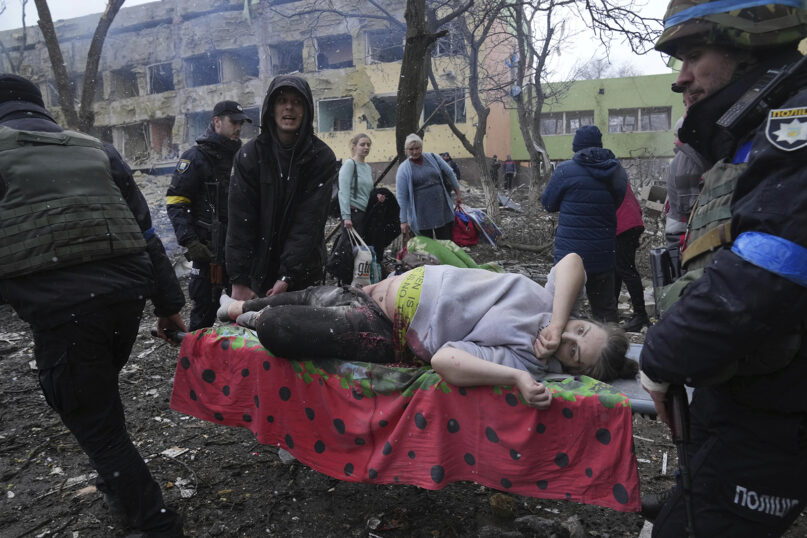This is hardly the most grievous issue in the current Ukraine conflict, but here goes: What is the proper way to refer to that country?
For many years, we called it “the Ukraine.” But nowadays, “the” has disappeared, and it is simply “Ukraine.”
As grammar guru (and my former Eisner camper) Benjamin Dreyer writes:
“Things (and people) change, including the names of things (and people), and innocuous-looking shifts in nomenclature can carry significant content, and one does well to keep up.”
Why was it “the Ukraine?” Unbeknown to most of us, that little definite article was a definite marker — of Ukraine “merely” being a region of Russia.
It is similar to how the world once referred to that country north of Israel as “the Lebanon.” That was the biblical term for the area, going back to its first mention in Deuteronomy — a geographical region, what would someday be referred to as Phoenicia, a loose collection of late Canaanite kingdoms, the area around Mount Lebanon — but, not a country. As it was not a country during Ottoman times, and as Syrians would like to craft the narrative, part of this thing called “great Syria.” That is, until it became a refuge for Maronite Christians, and a state in and of itself.
So, yes — “the” is complicated.
Place names matter. So do the names of cities.
- No longer Peking, but Beijing. Peking was its Romanized spelling. (But try ordering Beijing duck in the local Chinese restaurant).
- No longer Bombay, but Mumbai — which comes from Mumba Devi, the patron Hindu goddess of the island’s original residents.
- Burma or Mynamar? It’s complicated. Mynamar is the official name of the country in the Burmese language
So, what is the right way to refer to the currently besieged and endangered country?
Ukraine. Plain and simple.
Its place names:
- Kyiv, not Kiev, which is the Russian spelling.
- Lviv, not Lvov (Polish) or Lemberg (German).
- Kharkiv, not Kharkov.
Yes, it might be annoying to us writers and typists.
But, there is a reason for those spelling changes. They are a linguistic rejection of the previous power imbalance, in which an occupying or colonial power dictated spelling and pronunciation. The imposition of foreign names — or, names chosen by foreigners — was itself a presumptuous act of colonialism.
It is similar to the use of “new.”
As Timothy Snyder writes in his dazzling book on Russia, the Russian hunger for territory is ancient, and even mythic. Russian imperial memory stretches back to the 900s. in 1774, the Russian Empire defeated the Ottoman Empire, and annexed territories on the north shore of the Black Sea, some of which are now part of Ukraine. These territories were dubbed “Novorossia” — “New Russia.”
Empress Catherine spoke of “New Russia” much as British colonizers spoke of a “New England,”“New South Wales,” and so on. In that age of empire, regions inhabited by people other than the colonizers were “new” from the colonial perspective. “New” meant that the region had not always belonged to the empire. Such places did not necessarily remain with the colonial power. New England and New South Wales are not parts of Britain, just as New Russia is not part of Russia.
The way we render, and spell, a name matters. Which brings me to President Volodymyr Zelenskyy.
Please note, in this tale of two Vlads: it is Vladimir Putin, and Volodymyr Zelenskyy.
Yes, that double y thing is relatively recent — making every previous reference to him a typo. And why the double y? In order to conform more closely with the way that Ukrainians themselves would pronounce those names. As a former student of Russian, I can say that the double y thing is almost impossible for non-Slavic language speakers to figure out.
So, yes: Volodymyr, not Vladimir.
In much the same way, there is considerable controversy over how to spell the name of the Cossack leader who was responsible for the brutal massacre of hundreds of thousands of Jews in Ukraine in 1648-1649.
Is it Bogdan Khmelnytsky?
That is how Wikipedia prefers it. Gershom Scholem preferred Chmielnicki.
Or: Chmielnitsky? Or: Chmielnitski?
However you want to spell it — like the name of Haman, the genocidal wannabee villain of the upcoming Purim story — his memory deserves to be blotted out.
Whoever was responsible for decreeing the dropping of “the” from Ukraine, and throwing in another y to Zelenskyy — vitayu — congratulations.
Names matter. Getting them right is the least that we can do.






